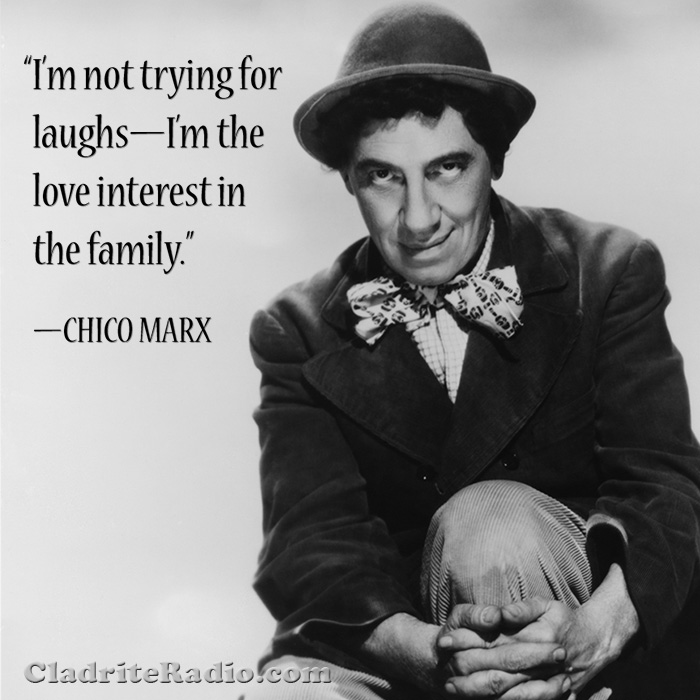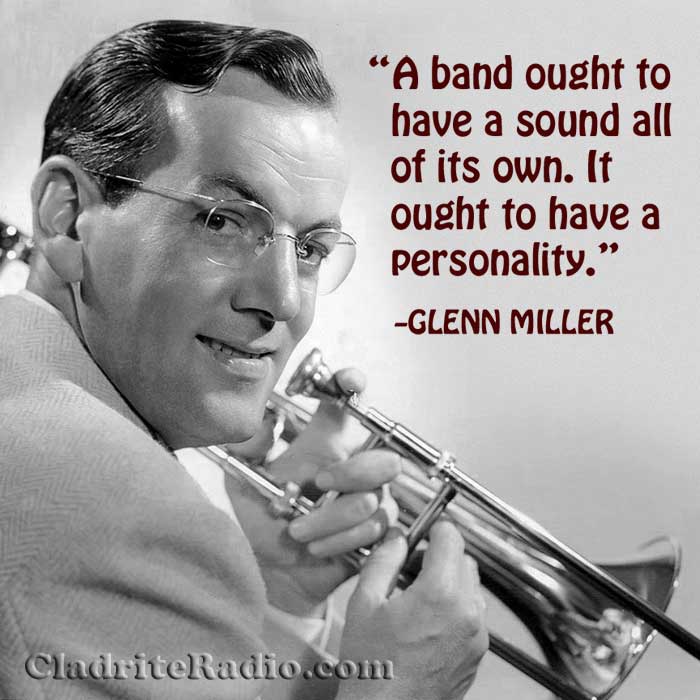Here are 10 things you should know about Chico Marx, born 136 years ago today. He enjoyed success in vaudeville, on Broadway, in pictures, on radio, in nightclubs and on television.
Tag: Ben Pollack
10 Things You Should Know About Glenn Miller
Here are 10 things to know about Glenn Miller, born 119 years ago today. Though he left us too soon, he made an indelible mark on music.
We’re featuring his music all day on Cladrite Radio, so tune in now!
Happy 130th Birthday, Chico Marx!
The irrepressible Chico Marx, the eldest of the legendary Marx Brothers, was born Leonard Marx 130 years ago today in Manhattan, New York. Here are 10 CM Did-You-Knows:
- Chico’s father, Samuel Marx, emigrated to the U.S. from Alsace-Loraine; his mother, Minnie Schönberg, came over from Germany. Sam, known as Frenchie, was, according to his famous sons, NYC’s worst tailor.
- Chico was the eldest of the brothers who would go on to become world famous, but he was not the first-born of Minnie and Sam’s offspring. Their first child, a son named Manfred, died as an infant.
- Of Jewish heritage, Chico honed his Italian accent as a youth, navigating the Upper East Side’s rough-and-tough Yorkville, a neighborhood where the predominant ethnicity changed from block to block, making it advisable to be able to pass when confronted with unfriendly locals.
- For most of his life, Chico had two interests: women and gambling. As a youth, he had already become such a gambler that none of the family’s possessions were safe from the pawnshop. Frenchie frequently had to pay for the privilege of retrieving his tailor’s shears.
- Chico Marx experienced much more success as a womanizer than a gambler. Though his gambling habit left him short of money most of his life, his charming (and persistent) personality paid off royally in the area of female companionship.
- Chico was not only the eldest surviving Marx brother, he was also Minnie’s favorite. She doted on him, even paying for him to take piano lessons when money was very tight. Her investment paid off as early as his adolescence, when he was paid to tickle the ivories at silent movie theatres and in bordellos (when Chico would skip out on these gigs, his younger brother Arthur (later Harpo), who closely resembled Leonard when they were young, would often take them over, though his pianistic abilities fell well short of his older brother’s).
- Chico was the last of the four elder Marxes to join the family act; Herbert (later Zeppo), born in 1912, was much younger). Chico held a number of jobs as young man, including a song plugger gig in Philadelphia that he left to team with a singer named Aaron Gordon. They formed a vaudeville act called Marx and Gordon.
- The nickname Chico is properly spelled (and pronounced) Chicko. In May 1914, during the brothers’ vaudeville years, a monologist named Art Fisher gave them their nicknames during a backstage poker game. He was inspired to dub Leonard “Chicko” because of his penchant for chasing girls—often called “chickens” or “chicks” in those days. The brothers wouldn’t use their nicknames professionally until some years later, but after they started doing so, a typesetter omitted the K when spelling Chico’s name in a theatre program, and Chico continued to use that spelling thereafter.
- In January 1942, with the Marxes’ film career not yet over but definitely winding down and with Chico, as always, in need of money, he partnered with Ben Pollack to form a touring big band. The outfit was successful but short-lived—it broke up in July 1943, but not before having released four recordings on a pair of 78s. The band can be heard in action in a 1942 appearance on the radio program The Fitch Bandwagon. Jazz crooner Mel Torme spent time with the orchestra, serving as drummer and vocalist.
- Chico’s daughter, Maxine, did a little bit of film acting in the 1930s and went on to be a successful casting director. In 1980, she wrote an affectionate but honest memoir of life with her father entitled Growing Up with Chico.
Happy birthday, Chico Marx, wherever you may be!

Happy 112th Birthday, Maj. Glenn Miller!
Alton Glenn Miller was born 112 years ago today in Clarinda, Iowa. His family moved around a bit, to Nebraska and Missouri, before finally settling in Fort Morgan, Colorado, where Glenn attended high school. Having picked up the trombone in his junior high years (after dabbling with the cornet and the mandolin), he formed his first dance band with some fellow students, and by the time he had graduated from high school in 1921, he had his sights set on a career in music.
Miller attended the University of Colorado but devoted so much time to his pursuit of a musical career that his attendance (and, as one might expect, his grades) suffered. He finally dropped out of school, studied with the renowned musical composition theorist Joseph Schillinger and went on to play with a number of orchestras, led by such names as Ben Pollack, Victor Young, Nat Shilkret, Red Nichols and the Dorsey Brothers. He also played in the pit bands for two hit Broadway shows, Strike Up the Band and Girl Crazy.

In addition to playing trombone with the Dorseys, Miller served as arranger and composer, two roles in which he’d go on to have great success. In 1935, he organized an orchestra for British bandleader Ray Noble that included such later-prominent names as Claude Thornhill, Bud Freeman and Charlie Spivak. The orchestra appeared in the 1935 Paramount picture The Big Broadcast of 1936, marking Miller’s first appearance on the big screen.
Miller formed his own orchestra for the first time in 1937, but it lacked a distinctive sound and didn’t last long. Back in New York, he set about coming up with a sound that would be his and his alone. He did so by having the clarinet and tenor saxophone play the melodic line, while three other saxes played in close harmony (we think we’ve got that right—no arrangers, we!). The trick to it was using Wilbur Schwartz, a saxophonist, to play that clarinet. Schwartz had a fuller sound than many clarinet players didn’t, and that was what set the Miller orchestra apart. As Miller himself once put it, “The fifth sax, playing clarinet most of the time, lets you know whose band you’re listening to. And that’s about all there is to it.”
In the spring of 1939, the Glenn Miller Orchestra had a successful rusn first at the Meadowbrook Ballroom in Cedar Grove, New Jersey, and, more famously, at the Glen Island Casino in New Rochelle, New York, where they drew 1,800 patrons on opening night. Soon thereafter, the band’s record sales took off, beginning a long string of hit tracks that are still familiar today. Later that year, Time magazine observed that, of the 12 to 24 discs in each of the country’s 300,000 jukeboxes, between two and six were usually Miller’s.
From 1939 to 1942, the Miller outfit had its own quarter-hour radio show, sponsored by Chesterfield cigarettes, that aired three times a week. They also appeared in a pair of 20th Century Fox pictures, Sun Valley Serenade (1941) and Orchestra Wives (1942). A third film, Blind Date, was never made, due to Miller’s entry into the Army.
Miller’s sound was tightly arranged and well rehearsed, and jazz critics of the day (and since) have sometimes been harsh in their assessments of the group, but Miller didn’t care. He knew just the sound he wanted and insisted he didn’t view the orchestra as a jazz ensemble. The critics may have carped, but the public loved the orchestra’s music (and does to this day).
At the peak of his popularity in 1942, Miller pulled strings to be accepted into the Army (at 38, the Navy felt he was too old). He was made a captain (later promoted to major), and after being transferred to the Army Air Forces, set about to entertain the troops with his special brand of swinging sounds. He formed a 50-piece band and took it to England in the summer of 1944, where it performed some 800 times. The orchestra even made some recordings at the famed Abbey Road studios. Of Miller’s efforts to entertain the U.S. and Allied troops, General Jimmy Doolittle once said, “Next to a letter from home, that organization was the greatest morale builder in the European Theater of Operations.”
On December 15, 1944, Miller was to travel from Bedford, England, to Paris, France, to entertain troops there. His plane, carrying Maj. Miller, Lt. Col. Norman Baessell and pilot John Morgan, went down over the English Channel and was never recovered. The cause of the crash is said to have been a faulty carburetor. Miller was survived by his wife, Helen, and their adopted children, Steven and Jonnie; he was mourned by millions of adoring fans around the world. Miller was posthumously awarded the Bronze Star in 1945.
The list of Miller’s enduring hits is a long one: In the Mood, Moonlight Serenade, Chattanooga Choo-Choo, A String of Pearls, Pennsylvania 6-5000, (I’ve Got a Gal in) Kalamazoo, and so many more.
Happy birthday, Major Miller, wherever you may be!
